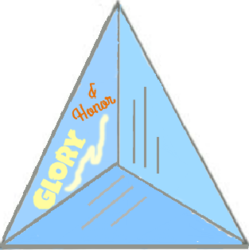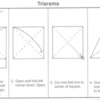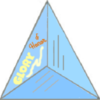Psalm 8
Art (or Creative Writing) Workshop

Summary of Lesson Activities:
Illustrate adjectives that describe God, while creating a prayer triorama.
For scripture reference and objectives, see above.
Leader Preparation:
- Read the scripture for this lesson.
- Read and reflect on the overview material provided for this lesson.
- Gather the materials.
Supplies List:
- Bibles
- A stiff type of paper (such as card stock); one already folded into a rectangular triorama (see attachment at end of lesson)
- Handouts of Psalm 8 (1 per student - Create this using whatever Bible version you will use)
- Markers, colored pencils, crayons
- Some plates or bowls or other containers to distribute the markers/crayons
- An easel and an appropriate marker
- Paper or plastic cups (6 per student) - optional
Before Start of Class:
- Place Bibles around the table.
- Place various colors of markers and crayons into smaller containers. (Makes it easier for students to reach when these containers get distributed around the tables.)
- Fold about 15 pieces of card stock: hold the paper horizontally (landscape style) and fold into equal thirds. [Refer to the example.]
- Watch this video on 3-2-1 cup stacking (optional - to be used if there is time at the end of class).
Lesson Plan
Opening- Welcome and Lesson Introduction:
Greet your students warmly, welcoming them to today’s Cool Disciples workshop. Introduce yourself and any other adults.
Say: Today we’ll be talking about words. And we’ll be illustrating some words and creating something that will help us in our prayer time. [Show them a blank folded triorama.] First, let’s start with a prayer.
Ask for any prayer requests. Ask if anyone would like to lead the group in prayer. Use the Lord’s Prayer as the ending. [You may ask one or two students to lead the Lord’s Prayer.] A suggestion: “O LORD, our Lord, how majestic is your name in all the earth! Thank you for loving us and for wanting us to be your friends. Help us to see the majesty, the beauty and the wonder of all of your creation. (End with the Lord’s Prayer) Amen.
Dig - Main Content and Reflection:
Ask: Who can tell me what words you could use to describe a puppy?
Write their replies on the easel (soft, small, brown, etc.)
Say: These are describing words, words that tell us about our puppy. It is a ____ puppy. It is a ____ puppy. (Use a couple of the words the kids have given.) We call these describing words, adjectives. Adjectives tell us what size, or what color or what shape. Adjectives help us to describe something in more detail. Now we are going jump from thinking about soft, cuddly puppies to thinking about some words that we could use to describe God.
Ask: Is it easy to describe God? (accept all answers)
Say: I would like to read to you Psalm 8. Listening to Psalm 8 might help you to think of some adjectives to describe God.
Do: Make sure that everyone has access to a Bible.
Say: The Psalms were written many years before Jesus was born.
Ask: Where would we find the book of Psalms in the Bible? (in the Old Testament)
Why is it easy to find Psalms in the Bible? (because when you open a Bible in half you’ll likely be close to the Psalms)
Do: Have the children find Psalm 8. [Have the older kids help the younger kids.]
Say: As I read to you Psalm 8, be thinking about what sorts of adjectives would describe God.
Do: Read Psalm 8 slowly and dramatically. Ask them to tell you describing words they thought of as they heard Psalm 8. List their answers on the easel.
[Perhaps you’ll need to prime the pump…Ask them how they felt as they heard Psalm 8.]
Start the project:
Say: We are going to be making a triorama – a three-sided standing card. You may choose any three different describing words, either from this list we’ve made or any words that you may come up with. Write these three different words, one on each of the three sides of your triorama. Though if you'd want to you could write on all the sides. Write them in such a way that the word looks like the adjective. [You may need to give an example: The word ‘majestic’ could be written to fill the space. Give an example only if the kids seem clueless.]
Do: Pass out the art supplies. You may need to help younger students to write. Students will want to unfold the triorama in order to work at the project.
Discussion (as students are working):
Say: One of the nice things about psalms is that they give us words with which we can use to talk to God.
Ask: What do we call talking to God? (prayer)
Do you ever have a hard time praying to God, maybe you didn’t know what to say?
Say: If you are ever having a hard time praying, or a hard time knowing what to say to God, you can open a Bible to Psalms and read a psalm as a prayer! For example if you wanted to express to God your feelings about God’s creation you could read Psalm 8 as a prayer…
“Dear God, When I consider your heavens, the work of your fingers, the moon and the stars, which you have set in place, then I ask, Why do you care about us humans? Why are you concerned for us weaklings?”
Ask: Who can tell me about any other Psalms? (accept all answers)
Say: Psalms can be used as prayers. They are also used as songs.
Ask: Who wrote Psalm 8? (David)
Who remembers who David is? (King David, David & Goliath)
What was one of the jobs that David did? (shepherd)
Say: David spent part of his life as a shepherd, watching over sheep. In Bible times sheep slept outside at night, with their shepherd, under the stars. David is credited with writing many of the psalms. The book of Psalms contains 150 chapters, so there are 150 psalms. It is thought that David may have written about half of the psalms.
Ask: What was it that David was wondering about in Psalm 8? (Psalm 8:4)
Say: David asked God, “Why do you care about us humans?”
Ask: Have you ever wondered that same question?
Why do you suppose people are so important to God?
How has God shown you that you are important to him?
Closing:
Say: Keep your triorama where you will see it everyday. Perhaps on the dinner table at home. Use it in your prayer time with God.
Do: Have each of the children choose their favorite adjective to share with the class. Have each student say a one -line prayer such as “God you are ______ (fill in adjective).” Close the prayer with your own adjective and Amen.
If you have extra time:
Distribute six cups to any student who has finished with their project. Have them do a 3-2-1 cup stacking formation while reciting Psalm 8. (Use the Psalm 8 handout.) The cups start off in a single stack and are separated to form a pyramid with 3 cups on the base. Each time a cup is touched another portion of the verse is repeated. A suggestion:
O LORD, our Lord, how majestic is your name in all the earth!
1 2 3 4 5 6
Resources: Smith, Stephanie. a Creative Writing Workshop for Psalm 8 (which is no longer at this site). 2005.
A lesson written by Carol Hulbert for First United Methodist Church, Ann Arbor, MI, USA




